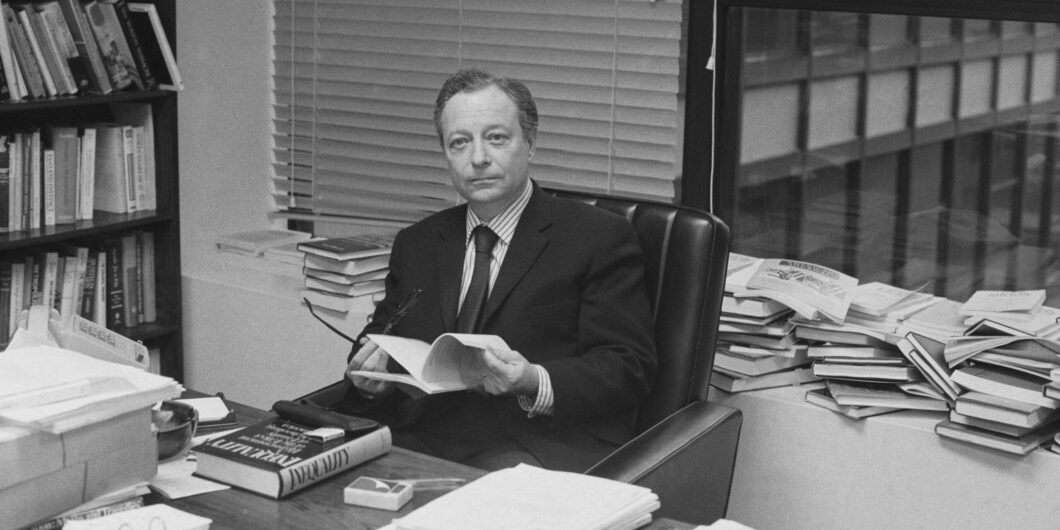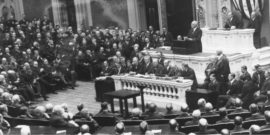Johnathan O'Neill and Joseph Postell respond to Bruce Frohnen's review of their American Conservatism, 1900-1930.
Jews and the American Creed
If the next best thing to seeing one’s book in print is to have it reviewed by a respected scholar in a publication of the highest intellectual caliber, I am thrice blessed, for David Lewis Schaefer’s review of my latest book, An Idea Betrayed: Jews, Liberalism, and the American Left, concludes: “By reminding us of the true meaning of liberalism, articulating the reasons for its decay, and explaining how Jews’ particular interest depends on a restoration of something like this country’s founding principles, Pilon’s book constitutes an important contribution to the enterprise to which [Ruth] Wisse calls American Jews and all their fellow citizens of good faith.”
Yet for all that good fortune, a point or two needs to be clarified. Early in the review, for example, Professor Schaefer endorses my thesis that the liberal idea has been betrayed, but he adds a caveat: “She underestimates the philosophical novelty of the specifically modern liberal tradition originating in the teaching of John Locke, whose influence is clearly seen in the Declaration. She goes so far as to suggest that the ‘honor’ of inventing liberalism might rather belong to Roger Williams because of his espousal of broad religious toleration than to Locke.” Actually, I was simply citing, not necessarily endorsing, W. K. Jordan’s opinion that Williams “surpassed John Locke” and Vernon L. Parrington’s view that he was “a forerunner of Locke and the natural rights school.” I would not presume to rank Williams among the Olympiad of political theorists.
No mere scholarly quibble, the issue is especially important at a time when too many public intellectuals are busy underestimating Locke’s contribution to America’s founding. I heartily share Professor Schaefer’s admiration for Locke, and for good reason: we are both University of Chicago alumni and former students and admirers of Joseph Cropsey, whose writings on Locke as well as Adam Smith are true classics.
A second, more arresting concern follows Professor Schaefer’s thoughtful overview of my discussion of a group of brilliant, if often neglected, liberal Jewish intellectuals—including Frank Meyer, Frank Chodorov, and Eugene Lyons—who helped William F. Buckley articulate and market what they called “the New Conservatism.” But Professor Schafer adds: “Curiously, however, Pilon never discusses the neoconservative movement of a couple of decades later, whose leaders included numerous Jewish intellectuals and social scientists like Irving Kristol and Nathan Glazer.”
Here too, a clarification is in order. Strictly speaking, Professor Schaefer is correct: I do not discuss the “neoconservative movement” in so many words. But contrary to this potentially devastating criticism, I did include lengthy discussions of Commentary editor Norman Podhoretz and other intellectuals usually labeled neoconservative.
Full disclosure: many “neocons,” as they are un-affectionately labeled by their adversaries, happen to be among my closest friends and longtime colleagues. After creating the United Nations Assessment Project at the Heritage Foundation in 1981, the year the formidable Midge Decter (Podhoretz’s wife) joined its board, I collaborated closely with the US Mission to the UN. It was then a who’s who of “neocons,” mostly Jewish liberals, Commentary contributors who had become disillusioned with the anti-Americanism and hypocrisy of the 1960s and ‘70s. As they turned even further right than other disillusioned radicals who in 1954 founded Dissent Magazine, there was hell to pay.
One Dissent contributor later admitted that the magazine “and its circle in the early 1970s invented the term [“neoconservative”] to denigrate the right-moving intellectuals who wrote in Commentary and the Public Interest.” The label first appeared in print in a Fall 1973 article by Michael Harrington titled “The Welfare State and Its Neoconservative Critics,” soon shortened to “neocons.” The epithet was obviously resented by those it sought to denigrate. Indeed, in 1979, the mild-mannered Irving Kristol quipped that he was “the only living and self-confessed neoconservative, at large or in captivity.” He often said that he was simply “a liberal mugged by reality.” While eventually resigned to the label, he still denied that it described a movement; it was merely a “persuasion.” Others continued to resist it.
The Founders were liberals who faced reality without having to be mugged by it.
Resorting to deceptive political warfare, Harrington accused “neoconservative ideologues [of] bas[ing] themselves on what they regard as the data of the sixties, but they do not take into theoretical account how the limitations of the period permeate their evidence and skew their conclusions.” The opposite was true. His erstwhile friends had responded to evidence provided by sociologists like Seymour Martin Lipset, Nathan Glazer, and others, indicating that liberal goals were being undermined rather than advanced by tactics promoted by progressives on “theoretical”—Marxspeak for “ideological”—grounds. “Invented as an invidious label to undermine political opponents, most of whom have been unhappy with being so described,” wrote Lipset, the word was a rank slur. “An insult, along the lines of ‘running dog’ or ‘fellow traveler,’” fumed Jonah Goldberg, one of those thus insulted. He added: “Or perhaps the ‘neo’ was intended to conjure ‘neo-Nazi,’ the only other political label to sport the prefix” at that time.
Many resisted the loss of their identity as liberals. Politically savvy, “they understood the strategic disadvantage of any sort of conservative label,” wrote James Nuechterlein in Commentary, “and they wanted to maintain proprietary rights to an honorable tradition to which they felt deep ties and affection.” In this they resembled conservatives like Herbert Hoover, who balked for years at being labeled a conservative by progressive political enemies; he considered himself a liberal. So too did Senator Robert Taft and many other Republicans.
The tide, however, appears to be turning, as more self-described liberals join the ranks of the reality-mugged. Many share Ruth Wisse’s revulsion for her Harvard colleagues’ arrogant leftism. Their smug “assumption that their positions are obviously true and beneficial,” she writes in the July 6, 2023, issue of the Wall Street Journal, is “one reason I stopped thinking of myself as a liberal. Conservative views are nowhere more necessary than in an institution of learning that is charged with conserving the republic.” Perhaps some will feel more comfortable with conservative liberalism. A seemingly oxymoronic term, it better embraces the complexity of America’s founding creed—for the Founders were liberals who faced reality without having to be mugged by it.
This is a conversation that I owed my readers, and I thank Professor Schaefer and Law & Liberty for having prompted me to elaborate on this important topic.



